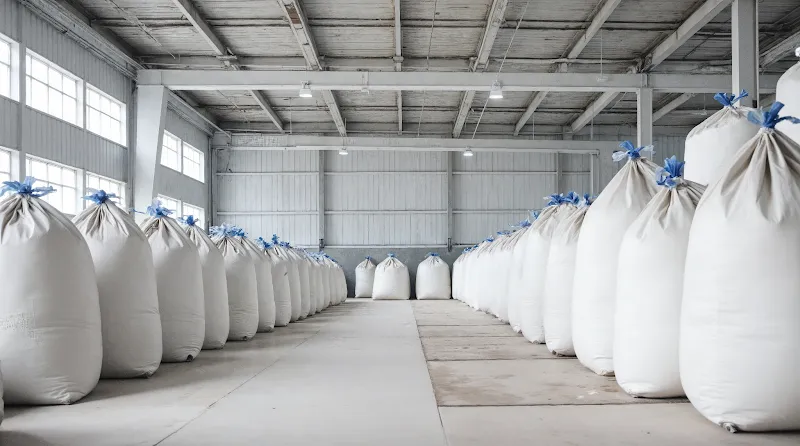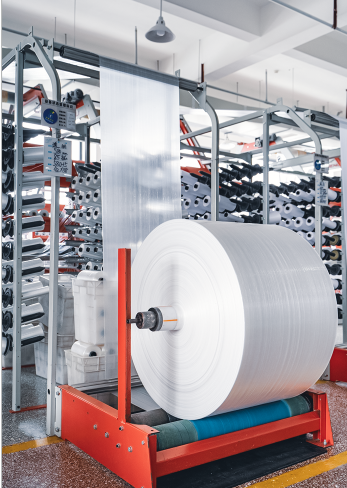La manipulation de produits chimiques n’est jamais simple et un emballage inapproprié peut entraîner des risques pour la sécurité, un gaspillage de produit ou une non-conformité coûteuse.
C'est pourquoi les sacs en vrac FIBC pour produits chimiques sont désormais le choix privilégié de nombreuses entreprises du secteur.
Ils protègent non seulement les matériaux sensibles, mais rationalisent également la logistique et réduisent les coûts.
Vous êtes curieux de savoir comment un seul type de sac peut faire tout cela ?
Explorons pourquoi les FIBC sont devenus un élément révolutionnaire dans le stockage et le transport de produits chimiques.

L’industrie chimique exige des emballages capables de gérer des matériaux dangereux, corrosifs et parfois instables.
Sacs en vrac FIBC, également connus sous le nom de Conteneurs intermédiaires flexibles pour vrac—sont conçus pour transporter de grands volumes de poudre, de granulés ou de produits chimiques liquides avec un risque minimal.
Contrairement aux fûts lourds ou aux conteneurs rigides, ces sacs sont légers, prennent moins de place et sont beaucoup plus faciles à manœuvrer.
Au-delà de leur côté pratique, ils répondent à des exigences de sécurité strictes qui garantissent le respect des réglementations en matière de manipulation des produits chimiques.
De nombreuses entreprises se tournent vers un fournisseur de sacs chimiques qui peut fournir FIBC personnalisés qui répondent aux besoins exacts de sécurité des différents produits chimiques.
La sécurité est toujours la priorité numéro un dans l’emballage des produits chimiques.
La conception des sacs en vrac FIBC utilise des tissus durables qui minimisent les fuites et aident à protéger le contenu de la contamination.
Pour les poudres dangereuses ou les produits chimiques sensibles à l'humidité, ces sacs peuvent inclure des doublures intérieures ou des couches barrières qui offrent une protection supplémentaire contre les éléments externes.
Pour les substances hautement réactives ou inflammables, la question se pose souvent : « Quel type de FIBC convient à une utilisation avec des liquides inflammables ? »
La réponse réside dans conceptions spécialisées de FIBC, en particulier les sacs de type C et de type D.
Les FIBC de type C sont mis à la terre pendant le remplissage et le déchargement, empêchant l'accumulation d'électricité statique, tandis que les sacs de type D utilisent tissus antistatiques qui neutralisent les étincelles sans mise à la terre.
Cela garantit une manipulation sûre dans des environnements où des vapeurs inflammables peuvent être présentes.
Comparés aux options d'emballage rigides, les sacs en vrac FIBC s'avèrent plus abordables à l'achat et moins chers à expédier.
Leur conception légère réduit les frais d'expédition et leur nature pliable rend le transport de retour ou le stockage plus efficace.
Un sac peut contenir jusqu’à 2 000 kilogrammes de matériau, ce qui minimise le nombre d’unités nécessaires et réduit les frais d’emballage.
Les usines chimiques sont souvent confrontées à des problèmes de stockage.
Les sacs en vrac FIBC sont empilables et, lorsqu'ils sont vides, ils se replient à plat, ce qui permet d'économiser un espace précieux dans l'entrepôt.
Cela en fait une solution idéale pour les entreprises qui cherchent à maximiser l’efficacité du stockage sans compromettre la sécurité.
Différents produits chimiques nécessitent différents niveaux de protection.
Un fournisseur fiable de sacs chimiques peut proposer des options personnalisées, notamment :
Cette flexibilité garantit que chaque produit chimique est emballé dans un sac adapté à ses risques et exigences spécifiques.
La responsabilité environnementale est devenue une question de plus en plus importante dans le secteur chimique.
Sacs à vrac FIBC sont réutilisable et recyclable, ce qui contribue à réduire les déchets d’emballage.
De nombreux fournisseurs proposent désormais des options écologiques fabriquées à partir de polypropylène recyclable, soutenant ainsi les entreprises dans leurs efforts pour atteindre leurs objectifs en matière d’initiatives écologiques et de responsabilité sociale des entreprises.
Grâce à des boucles de levage solides, les FIBC peuvent être rapidement déplacés par des grues ou des chariots élévateurs, réduisant ainsi la manutention manuelle.
Cela réduit la manutention manuelle et augmente la sécurité au travail.
Leur capacité à contenir de grands volumes signifie également moins d’unités à gérer pendant l’expédition, ce qui réduit les coûts de main-d’œuvre et simplifie la logistique.
L’efficacité des sacs en vrac FIBC dépend du choix du bon fournisseur de sacs chimiques.
Un fournisseur de confiance fournit non seulement des sacs conformes aux normes de sécurité internationales, mais offre également des conseils d'experts sur le type de FIBC le mieux adapté à chaque application chimique.
Du choix de la doublure appropriée à la détermination de la nécessité d’un sac de type C ou de type D, un fournisseur compétent joue un rôle essentiel dans la gestion de la sécurité chimique.
En bref, les sacs en vrac FIBC pour produits chimiques sont une solution essentielle pour un stockage et un transport de produits chimiques sûrs, efficaces et durables.
Ils offrent des caractéristiques de sécurité inégalées, des économies de coûts et une adaptabilité qui les rendent bien supérieurs aux méthodes d’emballage traditionnelles.
Avec le bon fournisseur et une sélection appropriée du type de FIBC, les entreprises chimiques peuvent garantir la conformité, protéger les travailleurs et préserver l'environnement.




